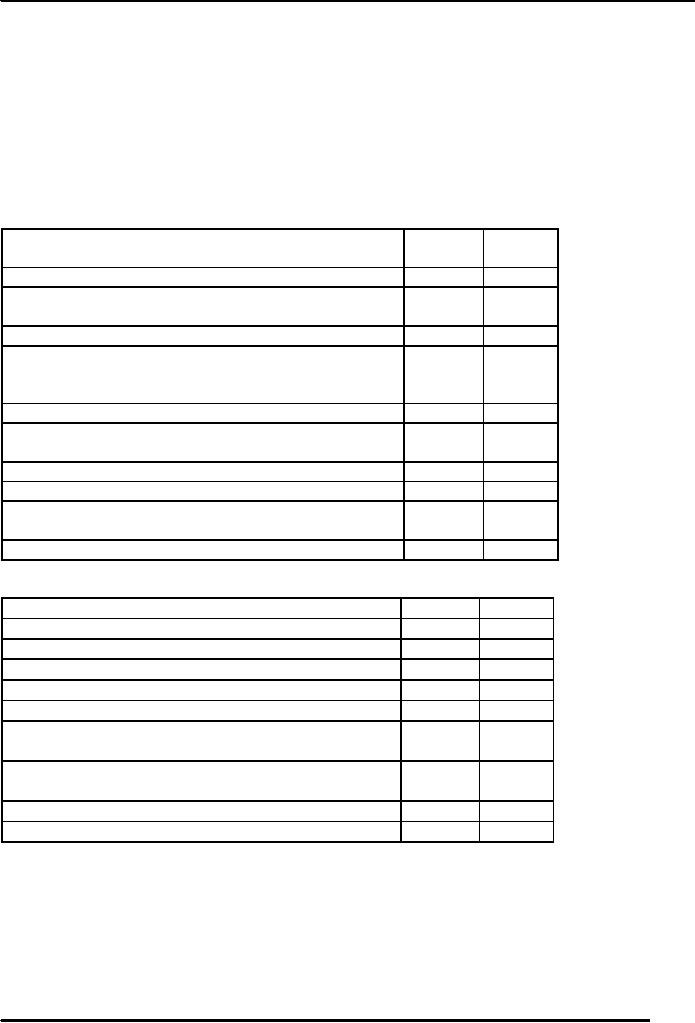 |

Human
Relations MGMT611
VU
Lesson
25
CHOOSING
A CAREER-II
A
career is a series of related
job experiences that fit
into a meaningful pattern. A general
strategy for
making
a sound career choice is to
understand first the inner you,
including what you have to
offer, and
then
match that information with
information in the outside
world.
The
Self-Esteem Checklist
Indicate
whether each of the
following statements is Mostly
True or Mostly False as
it
applies
to you.
Mostly
Mostly
True
False
1.
I am excited about starting
each day.
1.
Most of any progress I have
made in my work or school
can
be attributed to luck.
2.
I often ask myself, "Why
can't I be more
successful?"
3.
When my manager or team
leader gives me a
challenging
assignment, I usually drive in
with
confidence.
4.
I believe that I am working up to my
potential.
5.
I am able to set limits to what I
will do for others
without
feeling anxious.
7.
I regularly make excuses for my
mistakes.
8.
Negative feedback crushes
me.
9.
I care very much how much
money other people
make,
especially
when they are working in my
field.
10.
I feel like a failure when I do
not achieve my goals.
11.
Hard work gives me an
emotional lift.
12.
When others compliment me, I
doubt their
sincerity.
13.
Complimenting others makes me
feel uncomfortable.
14.
I find it comfortable to say,
"I'm sorry."
15.
It is difficult for me to face up to my
mistakes.
16.
My coworkers think I am not worthy of
promotion.
17.
People who want to become my
friend usually do not
have
much to offer.
18.
If my manager praised me I would
have a difficult time
believing
it was deserved.
19.
I'm just an ordinary
person.
20.
Having to face change really disturbs
me.
Scoring
and Interpretation: The
answers in the high
self-esteem direction are
as
follows.
76

Human
Relations MGMT611
VU
1.
Mostly True
8.
Mostly False
15.
Mostly False
2.
Mostly False
9.
Mostly False
16.
Mostly False
3.
Mostly False
10.
Mostly False
17.
Mostly False
4.
Mostly True
11.
Mostly True
18.
Mostly False
5.
Mostly True
12.
Mostly False
19.
Mostly False
6.
Mostly True
13.
Mostly False
20.
Mostly False
7.
Mostly False
14.
Mostly True
17-20
You
have very high self-esteem.
Yet if your score is 20, it could be
that you are
denying
any self-doubts.
11-16
Your
self esteem is in the average range. It
would probably be worthwhile
for you
to
implement strategies to boost your
self-esteem (described in this
chapter) so
that
you can develop a greater
feeling of well-being.
0-1
Your
self-esteem needs bolstering. Talk
over your feelings about
yourself with a
a
trusted friend or with a
mental health professional. At
the same time, attempt
to
implement
several of the tactics for
boosting self-esteem described in this
chapter.
Source:
DuBrin,
Andrew J. `Human Relations: Career
and Cersonal Success',
Pearson Prentice Hall,
2005.
Ten
steps for choosing a
career
We
can identify a career
following these ten steps
which is more compatible with
our interest
1.
Begin with your
values
2.
Identify your skills and
talents
3.
Identify your
preferences
4.
Experiment
5.
Become broadly literate
6.
In your first job, opt
for experience first and
money second
7.
Aim for a job in which
you can be committed
8.
Build your life style around
your income, not your
expectations
9.
Invest five percent of your
income, energy, and money
into furthering your
career
10.
Be willing to change and
adapt
Data,
people, things, or ideas
Knowing
your preferences for working
with data,
people, things, or ideas can
help you find a career
that
matches
those preferences. Most
managerial, professional, and
technical jobs provide some
opportunity for
working
with data, people, and
things.
Job
satisfaction is likely to increase
when the individual engages in
work that fits his or
her interest in the
four
factors. (Ideas
is
somewhat restricted because it
involves high-level
innovation.)
Choosing
a career and developing a portfolio
Career
This
lesson describes the process of
finding a first career,
developing a portfolio career,
and career
switching.
(A portfolio career refers to making
money in several different
ways at the same time.)
Portfolio
career and career
switching
It
is becoming increasingly common for
people to either switch the emphasis in
their work or switch
careers
entirely.
People modify their careers
for a variety of reasons, all
centering around the idea
that something is
missing
in their present one. Here
we look at two different
approaches to changing direction in a
career.
77

Human
Relations MGMT611
VU
A.
Developing
a Portfolio Career
Many
people would like to change
careers yet not be confined
to focusing on one major type of job
activity.
To
accomplish this, a growing number of
people develop a portfolio
career, in
which they use a variety of
skills
and earn money in several
different ways.
A
portfolio career also helps
deal with the trend toward
part-time positions. A portfolio career
also spreads
the
risk of unemployment by earning money in
several ways.
An
important part of developing a
portfolio career is to keep
your occupational skills current while
not in
active
use.
B.
Career
Switching
Many
people switch careers to find
work that fits their major
values in life. It is important to
be
thorough
when
contemplating a career switch. A new
career should be built
gradually, such
as phasing into the
new
type
of work. An increasingly popular
path for the career switcher
is to move
from salaried employment to
self-
employment.
Finding
about occupations
A
fundamental rule of career planning is to
gather relevant occupational facts. Few
people have valid
information
about careers they wish to
pursue.
A.
Printed
and Web-Based
Information
B.
Computer-Assisted
Career Guidance
C.
Speaking
to People
D.
Firsthand
Experience
E.
Choosing
a Growth Occupation
Strategy
to choose a career
A.
The
Importance of Skills in Choosing a
Career
Knowing
which skills and abilities you
possess and enjoy performing
can be the basis for a
successful
career.
A skill is a learned, specific
ability such as writing a
report or negotiating well. Skill
identification is
also
important for job finding.
Your best skill represents
your core competency, or
whatever you do best.
As
these skills are developed,
they may become a person's
core competency.
B.
Getting
Help from a Career
Counselor
A
career counselor provides a professional
approach to finding a first
career or career switching. A
counselor
usually relies on a wide variety of tests
plus an interview to assist a
person, make a sound
career
choice.
Suggestions
for career
Preparation
To
prepare for a career is to be
ready to meet the challenges
that lie ahead in whatever
career the person
chooses.
Nine useful suggestions
follow:
1.
Be
flexible about exploring
different fields.
2
Develop
interpersonal skills.
3.
Think
globally, such as studying another
language and culture.
4.
Develop
your information technology
skills.
5.
Get
an edge (employers can still
be choosy).
6.
Keep
learning after you have chosen a
field.
7.
Be
less concerned about
promotions; it is what you know
and how you apply it that
really counts.
8.
Strive
for high-quality work. "Do it
right the first
time."
9.
Recognize
that several different
concepts of a career are
possible. (The same career model,
such as
climbing
the ladder, does not fit
everyone, everywhere.)
References:
Dubrin,
A.J. (2005). Human Relations:
Career and Personal Success.
Upper Saddle River, New
Jersey,
07458.
78
Table of Contents:
- HUMAN RELATIONS:Some Guidelines for Effective Human Relations, Communication has 3meanings
- CULTURE AND PERSONALITY:Definition of sub culture, Definition of Personality, Types of Persons
- PERSONALITY AND STRESS:Personality, PERSONAL TOOLS TO CONTROL STRESS
- PERCEPTION AND INDIVIDUAL BEHAVIOUR:Three concepts of personality, Bias in Perception
- PERCEPTION AND GROUP BEHAVIOR:Characteristics of Groups, Individual and Group Behavior
- ATTITUDE AND BEHAVIOUR:Types of Attitudes, Steps to turn attitude into action
- PERSONAL MOTIVATION AND ACHIEVEMENT:Needs and Motivation, Self-discipline and motivation
- SOLVING PROBLEMS SKILLFULLY:Problem solving and cognition, Ways to solve problems
- CREATIVITY IN PROBLEM SOLVING:Barriers to creativity, Tips to solve problems creatively
- HANDLING PERSONAL ISSUES:Self-Defeating Behaviour, Positive attitude to tackle personal problems
- CONFLICT RESOLUTION:WHY SO MUCH CONFLICT EXISTS, TECHNIQUES FOR RESOLVING CONFLICTS
- COMMUNICATION AND HUMAN RELATIONS:Process of communication, Improving gender barriers to communication
- ORGANIZATIONAL COMMUNICATION:To improve listening skills, Types of organizational communication
- UNDERSTANDING COMMUNICATION STYLES:Modeling communication style, Sociability continuum
- SELF-ESTEEM:Building process of self-esteem, Self-esteem and public image
- BUILDING SELF-CONFIDENCE:The importance of self-confidence and self-efficacy, Balanced Self-Confidence:
- BECOMING A LEADER-1:Assessing leadership role, Traits and Characteristics of Effective Leaders
- BECOMING A LEADER-II:Theories of leadership, Developing leadership potential
- GLOBALIZATION AND CROSS-CULTURAL DIFFERENCES:Religious Values and Bicultural Identities
- IMPROVING CROSS-CULTURAL COMPETENCE:Strategies to improve cross-cultural relations, More steps to improve Cultural Relations
- BUILDING GOOD RELATIONS WITH MANAGERS:Impressing your manager, Coping with a problem manager
- BUILDING GOOD RELATIONS WITH CO-WORKERS:Make Co-workers feel important, Maintain Honest and Open Relationships
- BUILDING GOOD RELATIONS WITH CUSTOMERS:Salesperson Represents the Business, Approaching the Customer, Excuses vs. Objections
- CHOOSING A CAREER-1:Ten Myths about Choosing a Career, Attitude toward and Perceptions about Myself
- CHOOSING A CAREER-II:Choosing a career and developing a portfolio Career, Suggestions for career Preparation
- FINDING A JOB:Targeting your job search, The Internet and Résumé Database Services, Extreme Job Hunting
- SIGNIFICANCE OF RESUME:Major types of resumes, Electronic Submission of the Résumé
- IMPROVING INTERVIEW SKILLS:Successful interview, Knowing the employer or Organization
- IMPROVING WORK HABITS-1:Reasons of procrastination, Techniques for Reducing Procrastination
- IMPROVING WORK HABITS-2:Developing the proper attitudes and values, Time-management techniques
- NEW MODEL OF CAREER ADVANCEMENT:Career portability, HUMAN RELATIONS SELF-ASSESSMENT
- TAKING CONTROL OF YOURSELF:Develop Outstanding Interpersonal Skills, Business etiquettes
- EXERTING CONTROL ON OUTSIDE ENVIRONMENT:Important communication tip, Exerting control over the outside world
- MANAGING PERSONAL FINANCES-1:Your personal financial plan, Steps in budget making
- MANAGING PERSONAL FINANCES-2:Basic investment principles, Tolerance for Investment Risks, Types of investments
- ACHIEVING HAPPINESS-1:Finding happiness and enhancing your personal life, The key to happiness
- ACHIEVING HAPPINESS-2:The Five Principles of Psychological Functioning, Your mind and Happiness
- ACHIEVING HAPPINESS-3:Need for intimacy, Working out issues with relationships
- APATHY AND ITS REMEDIES:Let us try to understand the various definitions of apathy, Coping strategies for apathy
- ENHANCING PERSONAL ETHICS-1:Influence of Culture, Common ethical problems
- ENHANCING PERSONAL ETHICS-2:Common ethical problems, Guidelines for Behaving Ethically
- HELPING OTHERS GROW:Being a Nurturing, Positive Person, A list of mentoring behaviour, Coaching skills and techniques
- REVIEW-I:What is a Human Relation?, Meanings of Communication, Two types of stress, Some personal problem, Communication style
- REVIEW-II:Steps to build self-confidence, Globalization, Building Good Relations with Co-workers, Good work habits
- REVIEW-III:New model of career advancement, Choosing your investment, Tactics for Dealing with Difficult People